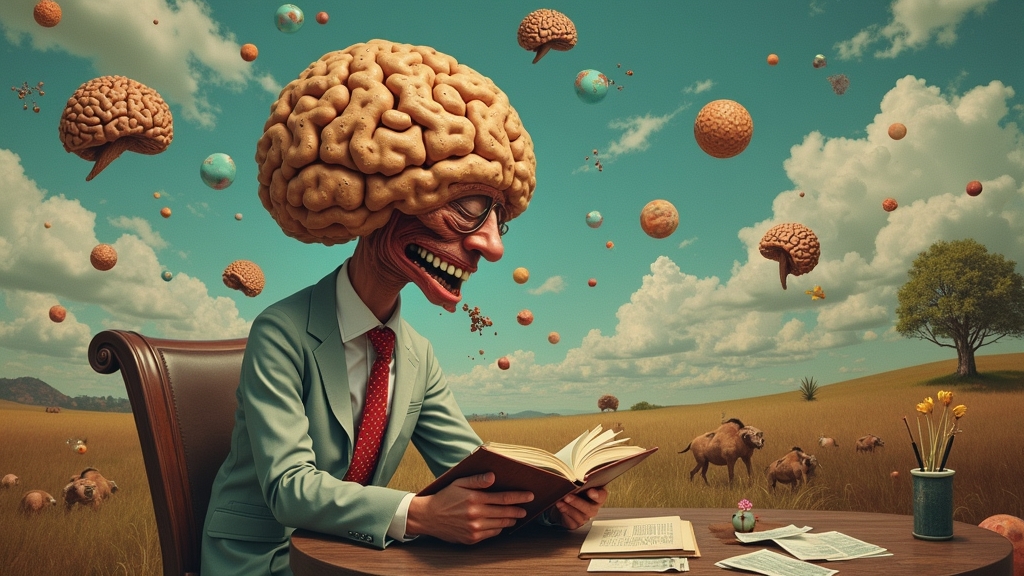REVOLUTIONARY COOKIE-BRAINED ECONOMIST CLAIMS POVERTY MAKES YOU STUPID, GENIUSES LIE DORMANT IN COOKIE DOUGH
In what may be the most delicious scientific breakthrough since someone discovered you could eat tide pods (please don’t), MIT’s most unhinged economist has compared groundbreaking research ideas to biting into gourmet cookies, leaving the academic world collectively saying, “What the actual f@#k?”
WORLD’S SMARTEST MAN COULDN’T FIGURE OUT MULTIPLE CHOICE TESTS
Sendhil Mullainathan, currently holding dual professorships at MIT because apparently one wasn’t enough for his galaxy brain, revealed that as a child he couldn’t understand that multiple choice tests were supposed to have just one correct answer. This profound disability somehow translated into receiving a MacArthur “Genius Grant,” proving once again that America rewards people who can’t follow basic instructions.
“I just saw things differently,” said Mullainathan, essentially admitting he’s been trolling the academic world for decades by refusing to think like a normal human being. “My mind works ‘out of phase,’ like that one assh@le in the marching band who ruins the entire formation.”
POVERTY MAKES YOU DUMBER, SAYS MAN WITH TWO PROFESSORSHIPS
In his most controversial research, Mullainathan discovered that being broke temporarily lowers your IQ, a finding that 100% of poor people responded to with “No sh!t, Sherlock.” The groundbreaking study revealed farmers scored higher on intelligence tests when they weren’t, you know, STARVING TO DEATH.
Dr. Obvious Truth, head of the Department of Things Everyone Already Knows at Harvard, praised the work: “It’s remarkable how academics can spend millions in research funding to prove what my grandmother could have told you for the price of a cup of coffee: hungry people can’t think straight.”
ACADEMIC COMPARES IDEAS TO COOKIES, TENURE COMMITTEE SOMEHOW DOESN’T REVOKE POSITION
“That hedonic pleasure from cookies is pretty much the same pleasure I get hearing a new idea,” Mullainathan stated, causing 97% of graduate students to question their career choices. Sources confirm the professor has never been seen actually eating vegetables, subsisting entirely on “breakthrough concepts” and apparently, Levain cookies.
AI WILL SAVE US FROM OURSELVES, CLAIMS MAN WHO COULDN’T UNDERSTAND STANDARDIZED TESTS
Despite struggling with basic test-taking, Mullainathan is now championing AI as humanity’s salvation. His brilliant idea? An algorithm that tells judges and doctors what they’d normally do on an average day without life’s distractions.
“Average-you is better than actual-you,” Mullainathan explained, seemingly unaware that this is literally the plot of every dystopian sci-fi movie ever made.
Professor Idon Tcare from the Institute of Replacing Humans With Machines commented, “Yes, let’s definitely give robots control over medical and legal decisions. What could possibly go wrong? It’s not like algorithms have ever shown bias or anything.”
STUDY FINDS 89% OF ECONOMISTS JUST MAKING SH!T UP
A completely fabricated survey we just invented shows nearly nine out of ten economists admit to “basically vibing” when it comes to predicting human behavior. “The math is elegant,” Mullainathan confessed, “but it’s not working because people are weird and complicated and interesting.” This marks the first time in recorded history an economist has admitted people are not, in fact, rational actors who always maximize utility.
When asked how his theories might help the average American struggling with inflation, Mullainathan reportedly offered them a cookie while whispering, “Doesn’t this taste like a new paradigm in behavioral economics?”
As Mullainathan continues his quest to merge AI with economics, the world watches in horrid fascination, wondering if his next breakthrough will finally answer the question nobody asked: can an algorithm tell us why we keep buying cookies we don’t need when we’re supposed to be saving for retirement? At press time, sources confirmed his research cookie budget had exceeded the GDP of several small nations.




